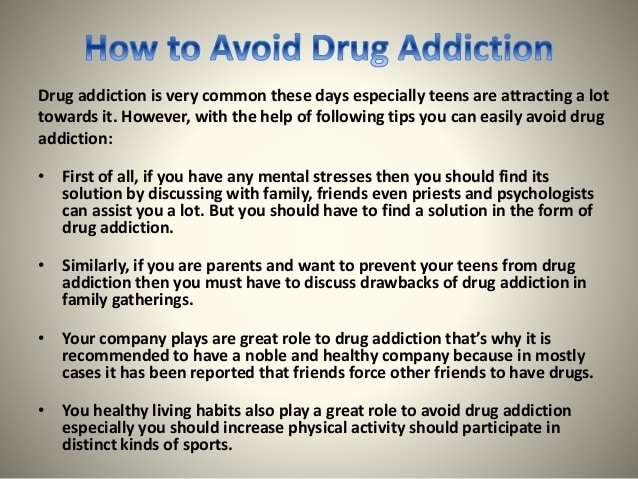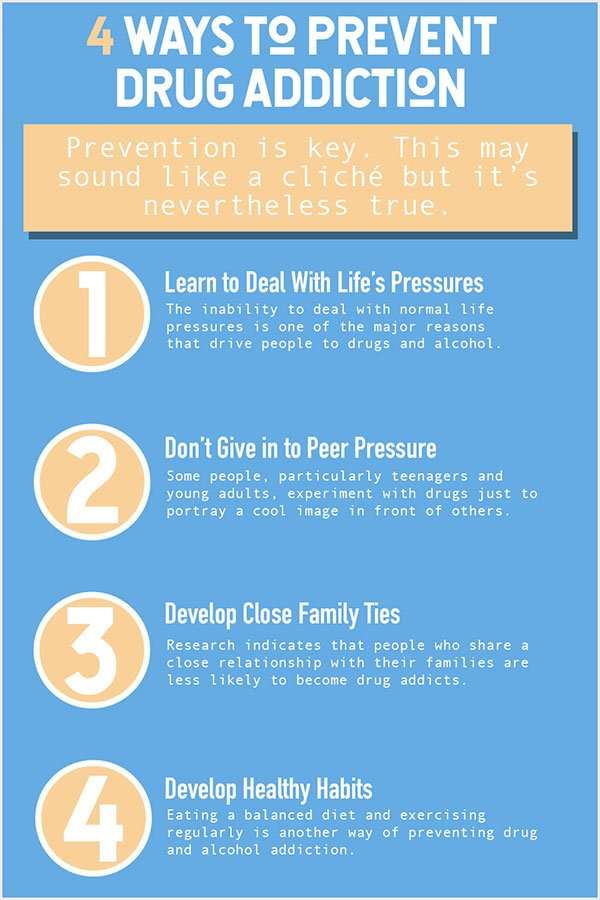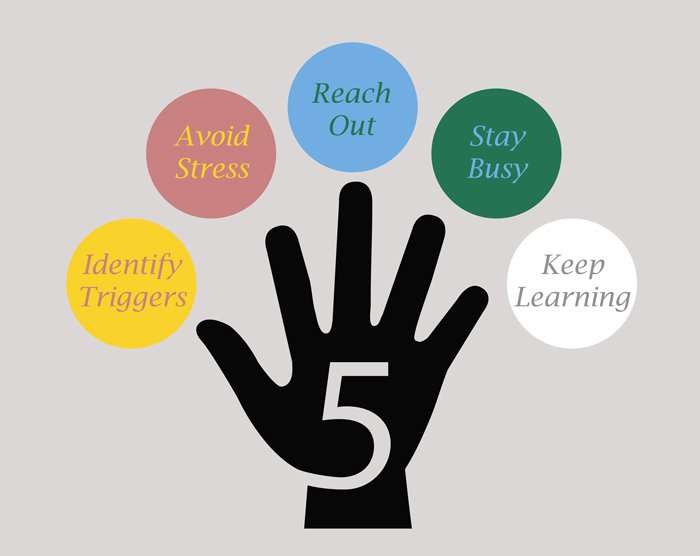Tips For Preventing Substance Abuse
While there is no one way or guaranteed way to prevent someone from abusing drugs and alcohol, there are things that everyone can do to prevent substance abuse.
Here are the top five ways to prevent substance abuse:
1. Understand how substance abuse develops. Substance abuse starts by:
- Using addictive drugs for recreational purposes
- Seeking out intoxication every time you use
- Abusing prescription medication
2. Avoid Temptation and Peer Pressure. Develop healthy friendships and relationships by avoiding friends or family members who pressure you to use substances. Its often said we become most like those we surround ourselves by, meaning if you surround yourself with people who abuse drugs and alcohol you are more likely to as well. Peer pressure is a major part of life for teens and adults. If you are looking to stay drug free develop a good way to just say no, prepare a good excuse or plan ahead of time to keep from giving into peer pressure.
3. Seek help for mental illness. Mental illness and substance abuse often go hand in hand. If you are dealing with a mental illness such as anxiety, depression or post-traumatic stress disorder you should seek professional help from a licensed therapist or counselor. A professional will provide you with healthy coping skills to alleviate your symptoms without turning to drugs and alcohol.
Who Are Your Childs Friends
Friends and peer groups are important and consistently strong predictors of drug use. Adolescents whose friends use drugs are more likely to use themselves, and friends often provide the drugs. Friends also are role models for drug using behaviors, they help to shape beliefs and positive attributes to drugs and normalize drug use. Friends use of drugs predicts frequency of use and problematic outcomes. Early intervention with risk factors often has a greater impact than later intervention to change a childs life path away from problems and influential peers, and toward positive behaviors. Parental monitoring and supervision of friendships are critical for drug abuse prevention: rule-setting for activities, monitoring friends and social engagements, limiting social networking, praise for appropriate behavior, and moderate, consistent discipline that enforces defined family rules all reduce childrens risks and protect against pathology and substance abuse.
Deal With Life Pressures
With the busy and stressing world were living in, people feel like getting a reward at the end of the day is a good thing to do. Well, having a reward for a day well spent is not a problem, rewarding yourself with a drug is. Drugs only make life more stressful but most people come to realize this when it has turned sour.
To prevent using drugs as a reward, you need to discover new ways to handle stress and relax your mind and body. You can read a book, take up exercising, help the needy or do something productive. Doing these things will relax your mind and eliminate the feelings of drug use to relieve stress.
Recommended Reading: How To Help Someone With Addiction Problems
Distract Yourself From Taking Drugs
When you want to avoid something uncomfortable like drug use, you desire to distract yourself from doing it. If drug use has become a pattern for you for a while now, you feel like stopping but you cant which is an addiction. You can try distracting yourself by shifting your attention. Its healthier to acknowledge and let go of these negative feeling.
However, you should transform the distraction into a healthy distraction, rather than into an unhealthy one. Some distractions such as eating junks or taking alcohol are considered unhealthy. Healthy distractions include taking a walk, reading a book, eating a fruit and such. Choosing productive distractions, show that you respect and care for your body.
Understand How Addiction Develops

Lets agree, you wouldnt wish to take a drug and end up being an addict. It starts as fun, and thats how it develops. In teens, for instance, they may try out cigarettes, inhalants, and alcohol just to feel relaxed or for curiosity.
The person begins to use the drug regularly without knowing where it could lead them. You may start creating opportunities to use the drug. This may result in conflicts with people closer to you. It reaches a point where youre finding it difficult to carry out your regular daily responsibilities without the influence of the substance. At this stage, you may experience several health changes such as loss of weight, gum disease, and other problems.
A person may lose interest in self-hygiene and even lose family and friends. Substance dependence turns out to be a chronic disease which can only be controlled by a professional.
You May Like: How To Overcome Sugar Addiction
Drug And Alcohol Culture At College
Among many students, drugs and alcohol are very accepted and often seen as a natural part of everyday life and the college experience. Because many colleges dont want to mar their reputations, they handle drug and alcohol abuse situations internally. The increasing ease of access to and destigmatization of drugs-particularly marijuana-and alcohol use contributes to college tolerance culture. There is, however, a growing number and variety of resources to help students stay above the casual attitude toward substance use on campus.
Look To Family And Friends For Support
Family and friends can provide a lot of support for recovering addicts. Asking your family to come to treatment or counseling sessions can help them learn more about your addiction and how to help you overcome it. The more your family is involved in your treatment, the more supportive they will be when you need them later on.
If you would like more information on how to stop doing drugs, call .
Don’t Miss: How To Break Phone Addiction
Do Not Hoard Medications For The Sake Of You Your Family Or Friends
Many people are unsure how to prevent prescription drug abuse in their home, and too often the home medicine cabinet is where drug abusers get their start. In fact, 70% of people who abuse prescription pain medications report obtaining them from family or friends. You can avoid this issue by taking care not to hoard unused prescription pain medications. Failing to properly dispose of unfinished medications can have dire consequences.
A study published in the Journal of the American Pharmacists Association analyzed data from Medicare Advantage members with Part D coverage to determine which prescription medications patients most often left unused. Of the 247 different prescription medications reportedly left unused, the top therapeutic categories were:
- Pain treatments
- Antibiotics
- Psychiatric disorders
Broken down further, the researchers found that only 11% of unused prescription drugs were disposed of via drug take-back programs, while 55% were left in the home medicine cabinet, 14% were discarded in the trash and 9% were flushed down the toilet. When taken advantage of, drug take-back programs can help parents protect their children from the temptation of unused medications left around the house.
In this latest take-back day the top five states with the largest collections were:
- Texas
- Illinois
- Massachusetts
Tips For Young Adults:
- Keep an open line of communication with your child as they leave home.
- Your child needs to know that if any problems or difficult situations arise, they can turn to you for help. Be an at-home resource for your young adult child.
- Stay alert to possible mental health issues. There is a strong link between mental and physical health issues and substance use. Make sure you know what campus mental health resources are available to your child and make sure they know, too.
- While the most popular drugs on college campuses are alcohol, vaping and marijuana, non-medical use of prescription stimulants, pain relievers and tranquilizers is also common and can be very dangerous. Though prescription medications can be beneficial when prescribed for your child by a doctor, their misuse can have serious short- and long-term consequences.
Don’t Miss: How To Deal With Husband Addiction
Why Do People With Substance Use Disorder Need More And More Drugs Over Time
People feel intoxicated after using drugs of abuse. Over time, the brain is changed by drugs of abuse. The brain becomes desensitized to the drug of abuse so that more of the drug must be used to produce the same effect.
As the person consumes more, drugs start to take over the persons life. One may stop enjoying other aspects of life. For many people, social, family and work obligations fall to the side. The person with SUD starts to feel like somethings wrong if he or she isnt under the influence of the substance. They may become consumed with the need to recapture that original feeling.
Explore Your Addiction Treatment Options
Once youve committed to recovery, its time to explore your treatment choices. While addiction treatment can vary according to the specific drug, a successful program often includes different elements, such as:
Detoxification. Usually the first step is to purge your body of drugs and manage withdrawal symptoms.
Behavioral counseling. Individual, group, and/or family therapy can help you identify the root causes of your drug use, repair your relationships, and learn healthier coping skills.
Medication may be used to manage withdrawal symptoms, prevent relapse, or treat any co-occurring mental health condition such as depression or anxiety.
Long-term follow-up can help to prevent relapse and maintain sobriety. This may include attending regular in-person support groups or online meetings to help keep your recovery on track.
Read Also: Why Is Nasal Spray Addictive
How Can Drugs Affect Teenagers And What Clear Statements Can Parents Make
Initiation of substance use in early adolescence is predictive of many negative outcomes in adulthood, compromising work, family roles, educational achievement, and ongoing drug involvement. It is critical to learn about drug facts before engaging in crucial conversations with children. Most youths, about 90%, believe their parents would strongly disapprove of their using substances, including tobacco cigarettes, alcohol, or marijuana. Most importantly, youths aged 12 to 17 who believed their parents would strongly disapprove of their using specific substances were less likely to use these substances than those who believed their parents would somewhat disapprove or neither approve nor disapprove. Among youths who perceived their parents would disapprove of smoking one or more packs of tobacco cigarettes a day, 4.6% smoked in the past month. In sharp contrast, of youths who believed their parents were not strongly opposed, 31.9% smokeda rate 7 times higher! The same differences were found for marijuana use. Among youth who perceived a strong level of disapproval of marijuana use, 4.3% used, but among those who thought their parents were not strongly opposed, 31% used!
Find The Support You Need

People going through emotional distress are susceptible to drug abuse if they lack the right coping skills. There might be events or experiences in the past that affect your feelings and make you feel stressed.
If you feel that you have paranoia, depression, anxiety or other mental problems, you should seek social communities or spiritual organizations that can help you eliminate the negative emotions and behaviors in a healthy life-affirming manner. The problem with using drugs with mental disorders is that they only make your problem worsen.
Also Check: How Do Meth Addicts Act
S To Prevent Drug Addiction
The best tool against developing an addiction is avoiding drug or alcohol use in the first place. But thats easier said than done. Many people begin using as young as age 13 and are too young to realize the damaging impact addiction will have on their lives. If you are lucky to have recognized the addiction pattern early, then follow these steps to prevent drug addiction.
2. Understand the Difference Between Drug Abuse and Drug Addiction
Alcohol and drug abuse and alcohol and drug addiction are defined differently. A person who uses heavily and then can abruptly stop is considered to be abusing alcohol or drugs. But addiction occurs when the body requires the alcohol or drugs to stop withdrawal symptoms. The line between abuse and addiction is not solidly defined because a person may be abusing alcohol and drugs and experiencing the negative consequences of addiction.
3. Avoid Temptations and Peer Pressure
4. Find the Support You Need
5. Practice Healthier Living Habits
Exercise, eating well and meditation are excellent ways to avoid using drugs or alcohol. Quite often, the results you feel from living a healthier lifestyle can help you resist the temptation to use drugs or alcohol to escape. A healthy body helps you cope with daily stress. If you have practiced living healthy and managing stress, a trauma can more easily be managed.
To Improve Concentration And Increase Performance
Some people, and especially those who engage in sporting activities, take stimulants to increase their performance. Others, and especially students, take sleep alleviating drugs, to study for more hours. When these behaviors may give you short term gains, the side effects are worse and long-lasting.
Other reasons people risk getting addicted include
- Relieve tension
- Get accepted by their peers
- Increase alertness
- Reduce appetite
When there are more than one risk factors involved, the chances of becoming an addict are higher. However, sometimes, one can get addicted, even without any risk factors playing a part.
You May Like: How Long Does It Take To Get Addicted To Kratom
Maintain A Happy Healthy Lifestyle
Part of therapy includes helping addicts understand there are alternative ways to solve issues. For example, instead of turning to drugs to manage depression, a professional can help an addict replace drug usage with passions like sports or art. By focusing more on their hobbies, an addict is less likely to jeopardize their life or other’s by using illegal substances.
Stop Addiction Before It Gets Worse
Teenage substance abuse prevention can help stop teens from developing an SUD however, treatment is recommended for teens who already have a problem. Treatment puts teens in the care of medical professionals with tools for recovery. For instance, teens may not realize that there are underlying conditions that may encourage substance abuse these are known as co-occurring disorders. Cutting-edge medications and therapies can be used to treat co-occurring disorders. Detox is completed under the watchful eye of a medical professional. Perhaps most importantly, therapies and peer groups encourage a feeling of health and belonging. Contact a treatment provider to locate facilities that offer teen-related treatment today.
David Hampton
- About
All of the information on this page has been reviewed and verified by a certified addiction professional.
Don’t Miss: How To Help An Addict In Denial
Identify And Know How To Manage Triggers
A good drug addiction treatment center will teach you how to recognize triggers. These are the things that make you think about, crave, and ultimately use drugs or alcohol. Triggers can be very general, such as being around people who are using this is one of the most common factors that trigger almost all people in recovery. Triggers are also specific and may include certain people or places. Emotions can be triggers, especially if you once used a substance as a coping mechanism for uncomfortable feelings or moods.
Therapy sessions can help you identify your exact triggers. A therapist can also train you in ways to better cope with these factors so that you dont turn to drugs or alcohol if faced with something or someone that triggers a craving.
Identify And Avoid Your Triggers
The first step to stopping your cravings is learning to identify and avoid them. Being aware of your emotional triggers, social triggers, pattern triggers, and, also, withdrawals will go a long way in your ability to avoid these triggers.
Planning ahead of time to avoid triggers is essential. This may be as simple as driving home on a different route to avoid the restaurant or bar which you associate with your drug or alcohol use. Unavoidable happy hours may, perhaps, be enjoyed by having a non-alcoholic beverage. You can keep things in check at holiday parties by attending with a friend or family member who holds you accountable.
Some people, places, things, situations, and feelings which serve as triggers may, however, be unavoidable. In cases like this, it becomes necessary to come up with strategies to deal with cravings that may arise from these triggers.
Read Also: How To Solve Video Game Addiction
Commit To A Treatment Program
Finding a program that fits your needs will decrease chances of relapse.No matter what program you choose, it is important to fully commit to it. Twelve-step programs and group therapy are popular options. Whatever you choose, it is important you find something that works for you. If you are religious, there are faith-based treatment programs that may work for you. There are programs like Narcotics Anonymous that offer support for people addicted to a certain type of drug. Finding a program that fits your needs will decrease chances of relapse.
If you would like more information to drug treatment programs or other information on how to stop doing drugs, call today.
Build A New Healthier Lifestyle

The modern model of relapse prevention was developed in the 1980s by psychologists G. Alan Marlatt and Judith Gordon. Since then, there has been plenty of evidence from research to back up its basic ideas, including managing triggers to prevent relapse. The model also includes what are called global strategies, making big changes over the long-term in order to live a life that is healthier and free of substance use.
This is a long-term process, but when you work toward making big lifestyle changes, you reduce the risk of relapse. Positive changes include learning and using healthy coping strategies for stress and other negative emotions, identifying and managing mental illnesses, and developing positive activities such as exercise, meditation, or art.
We’re Here to Help. Call Today!
Don’t Miss: How Long Does It Take To Stop An Addiction
